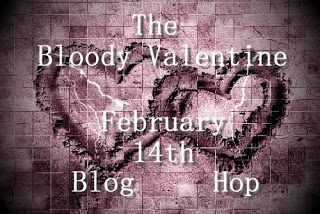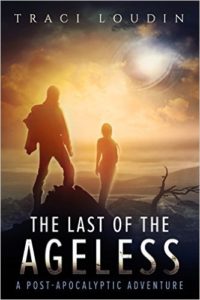Today, I’m playing host to part of the Bloody Valentine Blog Hop. Blog hops allow various bloggers to write about similar topics and then link amongst themselves. You can hop to the other participants’ blogs at the end of this post.
Will They or Won’t They?
One of my biggest pet peeves in fiction — both on screen and on the page — is when romantic tension as a subplot begins to undermine and subvert the main plot.
 That’s not to say that characters shouldn’t have relationships. But Valentine’s Day is the perfect time to admit I’m sick of the artificial sappiness!
That’s not to say that characters shouldn’t have relationships. But Valentine’s Day is the perfect time to admit I’m sick of the artificial sappiness!
“Will they or won’t they?” is one of the oldest plots there is, but my specific beef with it is when it starts as a subplot, then goes on to dominate and destroy the story.
There’s a time and place for romance as the main plot… that’s what the romance genre is for!
The perfect example is the TV show Castle. Season One started out well enough for a CSI clone, with a new twist on the also-classic whodunnit plot. Like all long-running TV series, it had its problems, but a covered up conspiracy and other plot arcs added complexity to regular crime de jour episodes.
But as it went on, the plot became less about mystery and more about romance. The romantic tension built to a crescendo, until it completely eclipsed the main plot. In short, Castle was no longer a crime/mystery show. It became a romance. Why did they do this? Was it fan service?
Will She Ever Find Love?
Why settle for complaining about Castle, when Western culture (or at least, American culture) is to blame? It’s Valentine’s Day — a day made for melodrama and over-the-top proclamations!
As a culture, we simply cannot be content with a single female protagonist — a female protagonist who is not part of, shall we say, a matched set.
Oh, but male protagonists are perfectly able to stand alone. They’re allowed to. In some genres, they’re not only allowed but expected to be single — adventure novels, sword and sorcery, etc.
We’re not conditioned to think in these terms about our male protagonists:
But will he ever find true love?
With female protagonists, that question’s always on our minds, as though she’s just not complete without a companion:
Who will she end up with?
Flipping the Equation
Western culture emphasizes unidirectional equality. As we seek to bring one side closer to the other, it’s the feminine side we change. In other words, “Why shouldn’t women wear pants?”
But in a true equation, BOTH sides of the equation are equivalent. To balance the equation, we should also proclaim, “Why shouldn’t men wear dresses?”
So, instead of cursing yourself for wondering who the heroine will settle down with, maybe what you should ask yourself is, how is it fair for the hero to be forever lonely?
I recently started watching a fantasy TV show from Canada called Lost Girl. I was disgruntled that the male and female leads end up in bed by the second episode. It’s just too obvious! But then I got to thinking — maybe this is for the best. They’ve already resolved any romantic tension on the upfront, which will allow them to concentrate on other plot points.
Not only that, but they’ve added depth to the romantic subplot by pairing two characters whose romantic natures are in conflict.
The female is a bisexual succubus. By nature, she’ll tend toward multiple partners. The male is a wolf. By nature, he mates for life.
Speculative Fiction Relationships
If speculative fiction calls for a romantic subplot, then it should arise and by driven by the unique elements of the story. A romantic subplot can and should be enriched by the story’s inherent science fiction and fantasy elements.
I’ve not gotten far in Lost Girl yet, but from what I’ve heard, the succubus may find herself in love not only with her male wolf companion, but also with her female doctor companion.
In The Hundred Thousand Kingdoms series by N.K. Jemisin, (see my Goodreads review of the first book) deities usually don’t pair up. Instead, they end up in threes, supposedly a more cosmically stable number. The sets we see in the books tend to be two males and one female.
And for those genres where the protagonist is traditionally a lone figure? Let’s challenge that. There are plenty of stories where a group of heroes bands together to defeat a common foe. Why can’t the same mechanic work with romantic partners?
 My first novel The Last of the Ageless has no romantic subplots to speak of. If you like the idea of adventuring through the apocalypse with no mushy gushy to get in the way of a book that’s action-packed with fight scenes, check it out.
My first novel The Last of the Ageless has no romantic subplots to speak of. If you like the idea of adventuring through the apocalypse with no mushy gushy to get in the way of a book that’s action-packed with fight scenes, check it out.
Leave a comment below or find me as +Traci Loudin on Google+, the perfect place for fans of science fiction and fantasy to hang out.
Comments
7 responses to “Does She Need a Valentine?”
Great post, and you get kudos for mentioning Lost Girl; I love that show.
Now I want to watch Lost Girl! And I have a clearer understanding of what's gone wrong with Castle. Great post.
Yes, the public seems to demand romance (something I tend to dispense with a stingy eyedropper), but I like your Lost Girl interpretation. Hook 'em up quickly to avoid the agony of a prolonged "Sam & Diana" situation, and get on with it. My eyedropper snorted approval too.
Sheila, you should definitely check it out! It's a little corny at times, but I'd put it on par with the old Buffy the Vampire Slayer series.
Keith, I love the eyedropper analogy. I know what you mean. And for me, if I hate reading it, I'm definitely not going to write it. I try to add just enough in the romance department so that my stories are realistic, but it never even qualifies as its own subplot.
We had a great discussion on G+ about this post. Thanks for stopping by and commenting directly!
Beautiful post, Traci! If I'd known about it, I would have linked to you when I wrote my similar blog over at The Fictorians (fictorians.com). Without a doubt, we are like-minded, so thanks for commenting over there and sending me your way. (We're always looking for great blogging guests over there, btw; maybe I'll hit you up sometime.) And I saw your blog's guest post on WFC… definitely go! I went this year for the first time and I feel like it changed my life. 🙂
Thanks for stopping and taking the time to look around, Evan! I'm really looking forward to getting the chance to go to the World Fantasy Convention sooner or later. Maybe I'll make it to the 2014 WFC in DC.
[…] is beta reading different from editing? What will I be reading? Have you done this before? What do you need from me? Do you have any examples of feedback? What if I have some bad news? Deadlines? What deadlines? […]